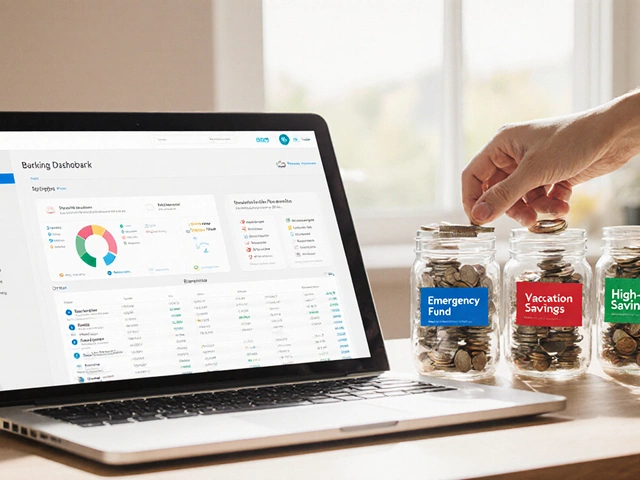
So, you're sitting on a 10 crore retirement fund, and you're pondering if it's enough to kick back and relax in India. Let's break it down. With inflation creeping up and expenses never taking a break, it's crucial to know what 10 crore can actually fetch you today.
First off, the cost of living varies wildly across India. Living a plush lifestyle in Mumbai isn't quite the same as enjoying a quiet life in a small town. Where you choose to set up your retirement nest can heavily influence how long your money lasts.
Then there's inflation. Even if it feels like money is growing on trees right now, inflation has a knack for sneaking up and claiming a chunk of your savings over the years. Best to have a handle on how it's affecting daily expenses and adjust your plans accordingly.
Mutual funds might just be your best friend here. They offer a nifty way to stay ahead of inflation and hopefully grow your wealth over time. The trick is knowing your funds, understanding the risks, and being proactive with your investments.
And, of course, life's little surprises. Medical emergencies, unforeseen expenses; things pop up. Planning for the unexpected is often the missing piece in retirement plans, but it's vital. Having a buffer can mean the difference between stress and a smooth ride.
- Understanding the Value of 10 Crore
- Inflation and Cost of Living
- Investing in Mutual Funds
- Planning for the Unexpected
- Creating an Adaptive Retirement Plan
Understanding the Value of 10 Crore
Let's dig into what 10 crore really means in today's world. It sounds like a whole lot of money, right? But to retire comfortably on it in India, you need to consider a few things.
First up, there's the reality of inflation. Even if you're a money wizard, inflation is that pesky villain that can chip away at your savings. For instance, something you buy today for a certain amount might cost almost double in another 20 years. Inflation generally ranges between 4-6% yearly, which means your money's buying power will reduce over time unless it's growing at a rate that beats inflation.
Cost of Living in Different Cities
Where you decide to settle affects how far your money goes. Cities like Mumbai and Delhi have a higher cost of living compared to places like Jaipur or Kochi. For example, property prices, healthcare, and daily expenses are significantly higher in metro cities.
| City | Cost of Living Index |
|---|---|
| Mumbai | 83 |
| Delhi | 78 |
| Kochi | 63 |
| Jaipur | 57 |
Choosing the right city based on your lifestyle preferences can make a difference in stretching your retirement funds.
Understanding Expenses
A big chunk of your expenses might go to healthcare in your golden years. It's crucial to factor in potential healthcare costs and insurance while doing your financial planning. Beyond medical expenses, consider entertainment, travel, and other lifestyle elements you wish to include in your retirement.
In summary, 10 crore sounds like a dream, but its real value hinges on how wisely you manage it. Smart investing and spending decisions will be crucial in ensuring it lasts throughout your retirement.
Inflation and Cost of Living
Inflation can seriously eat into your 10 crore retirement nest egg if you're not careful. Prices in India have been rising steadily, which means the buying power of your money diminishes over time. Smart management is key.
What's the Deal with Inflation?
Inflation is basically when prices of goods and services go up, and it’s a constant here and worldwide. Back in 2023, India saw an inflation rate hovering around 6-7%. It might not sound like a lot at first, but over a decade or more, it can add up significantly.
Impact on Daily Living Costs
The cost of living drastically varies across different regions in India. If you're planning to retire in big cities like Mumbai or Delhi, you're looking at higher expenses. Even daily necessities like groceries and utilities can pack a punch.
- Rent and housing costs can eat a huge chunk of your fund if you're in a metropolitan area.
- Healthcare - as you get older, medical expenses tend to rise. It's something to plan for.
- Transport and fuel costs aren’t getting any cheaper either.
Mutual funds can give you a leg up here. They have the potential to outrun inflation, given the right fund selections. Just be mindful that it's a long game, not a quick fix.
Using Your 10 Crore Wisely
Consider creating a diversified portfolio where a portion of your savings combats inflation effectively through investments. Sit down with a financial advisor to chat about strategies best suited for your situation.
| Area | Average Monthly Living Cost (INR) |
|---|---|
| Mumbai | 90,000 |
| Delhi | 80,000 |
| Bangalore | 75,000 |
| Small Town | 40,000 |
Planning is not just useful, it's necessary. Always keep an eye on market trends and make adjustments as needed. While 10 crore sounds like a massive amount, having a strong grasp of inflation and living costs ensures it really works for you in the long haul.

Investing in Mutual Funds
Alright, let's talk about diving into mutual funds. They can be your best weapon against inflation and your ticket to growing your retirement fund. Many folks think they're just stocks wrapped in a fancier package, but mutual funds can offer a whole lot more.
First, the basics. A mutual fund pools money from many investors to purchase a diversified portfolio of stocks, bonds, or other securities. The diversification means you're spreading the risk, which is a smart move if you're staring at retirement and want some peace of mind.
Types of Mutual Funds
Let's break it down a bit. There are different types of mutual funds you might want to consider:
- Equity Funds: These invest primarily in stocks. They can offer higher returns but come with higher risk. Timing the market isn't easy, but staying invested long-term generally pays off.
- Debt Funds: These are your go-to for a safer bet. They're all about investing in fixed-income securities. They might not make you an overnight millionaire, but they're less risky.
- Balanced/Hybrid Funds: Can't decide? Go hybrid. These funds invest in both equities and debts, aiming to balance the risk and return.
Why Choose Mutual Funds?
Now, why should you park your retirement savings in mutual funds? For starters, they offer professional management. You're not left picking stocks yourself—there's a fund manager doing the heavy lifting.
They also tend to outperform other investment options over the long haul. That's because of something called compounding returns, where you earn returns on your returns, and so forth. Sweet, right?
Getting the Most Out of Your Investment
To make sure you're squeezing every drop out of your investment, heed these tips:
- Define your goals and risk appetite. Knowing how much risk you can stomach is key.
- Keep tabs on fund performance. Past performance isn't a guarantee, but it helps to track.
- Diversify across different types of funds to manage risk better.
- Invest regularly via SIPs (Systematic Investment Plans). It helps remove the headache of market timing.
Your strategy should include checking in on your portfolio periodically. If the market takes a nosedive, don't panic and sell off everything. That's the time to stay calm and think long-term.
So there you go. Investing in mutual funds can be a great way to secure your golden years in India. Just remember, it's not a one-size-fits-all deal. Tailor your investments to suit your life.
Planning for the Unexpected
Sure, we all want to picture retirement as a sunny beach with no worries. But life has its own plans sometimes, and it's best to be ready. Having a game plan for those unexpected moments can make a world of difference for your retirement journey.
Building a Safety Net
First off, consider setting aside a part of your retirement savings as an emergency fund. Think of it as your financial cushion. An amount covering six months of expenses could provide peace of mind. Having this buffer helps you avoid dipping into your long-term investments in a panic.
Health Comes First
Healthcare in India is advancing but not without cost. Medical expenses can creep up on you, especially after retirement when cash flow may not be as smooth. Look into health insurance options that offer comprehensive coverage for you and your family. Consider policies that provide cashless treatments or act as riders to your existing medical insurance.
Revisiting Insurance Policies
Remember those insurance policies stowed away in the drawer? It might be time to dust them off. Make sure your life insurance policy is aligned with your current lifestyle and expected future needs. Sometimes, increasing coverage by a notch helps keep dependents secure without looking back at your mutual funds.
Longevity Risks
We're living longer, and that's great news! However, it brings its own set of challenges. Don't underestimate the need for a steady income stream throughout your retirement years. Consider annuities or longevity insurance policies that guarantee income right until you're ready to hand in your shoes.
Estate Planning
Thinking beyond your life, plan out how you wish to distribute your wealth. Draft a will or consider a trust to ensure your assets are passed on seamlessly. It prevents legal hassles for your kin and ensures your wishes are carried out as you envisioned.
Though it may seem daunting now, planning for life's surprises ensures you can enjoy retirement without unwelcome hiccups. Being prepared means more time enjoying the moment, and that's what retirement should truly be about.

Creating an Adaptive Retirement Plan
So you're thinking 10 crore sounds like a decent number for retirement, but are you really ready to sit back and relax? It's all about having a solid plan that can roll with the punches. Let's chat about some financial planning tactics you can use.
Stay Flexible
First things first—be prepared to tweak your lifestyle as needed. The world keeps changing, and so will your needs and interests. You might find that you want to travel more, or maybe healthcare becomes a bigger expense later on. It's not set in stone, and that's okay. Keep checking in with your goals and make sure they match up with reality. As financial guru Warren Buffett once said,
"Do not save what is left after spending, but spend what is left after saving."
Diversify Investments
How you invest matters just as much as how much you invest. Consider spreading your assets across various mutual funds. This lowers the risk and helps you keep pace with inflation over time. Some funds might do better than others some years, but having a mix can balance things out.
Emergency Fund
No plan is complete without a safety net. Well, that's where an emergency fund comes in. Aim for enough to cover at least six months of living expenses, maybe more if you're cautious. You'll thank yourself if any unforeseen expenses pop up, like sudden medical bills or home repairs.
Monitor and Adjust
Your retirement plan shouldn't be a 'set it and forget it'. Make it a habit to review your expenses, investments, and lifestyle every year. This helps you adjust quicker to any unforeseen changes and keeps you on track to live comfortably.
An adaptive retirement plan with a robust investment strategy in mind could make retiring on 10 crore a breeze. Stay sharp, keep evaluating, and ensure you're ready for whatever life throws your way!








Write a comment